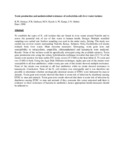| dc.contributor.author | K.W, Simiyu | |
| dc.contributor.author | P.B, Gathura | |
| dc.contributor.author | M.N, Kyule | |
| dc.contributor.author | L.W, Kanja | |
| dc.contributor.author | J.N, Ombui | |
| dc.date.accessioned | 2013-02-28T06:51:10Z | |
| dc.date.issued | 1998 | |
| dc.identifier.citation | East African Medical Journal Vol. 75 No. 12 December 1998 | en |
| dc.identifier.uri | http://erepository.uonbi.ac.ke:8080/xmlui/handle/123456789/12214 | |
| dc.description.abstract | To establish the types of E. coli isolates that are found in river water around Nairobi and to assess the potential risk of use of this water to human health.
Design: Multiple stratified sampling was carried out. Surface sampling was used in the entire study.
Setting: The study was carried out on river waters surrounding Nairobi, Kenya. Subjects: Forty Escherichia coli strains isolated from river water.
Main outcome measures: Serotyping, toxin gene tests and susceptibility to tetracyclines, ampicillin, chloramphenicol and kanamycin were analysed.
Results: None of the isolates could be specifically serotyped using the available antisera. Toxin gene production tests using the colony hybridisation technique revealed that nine (22.5 %) of the strains were positive for heat stable (ST) toxin, seven (17.5 0/0) to the heat labile (L T) toxin and two (5 0/0) to both. Using the Agar Disk Diffusion technique, eighty per cent of the strains were susceptible to all four antibiotics, while twenty per cent of the strains showed multiple resistance. None of the strains was resistant to all four antibiotics while no strain showed resistance to kanamycin.
Conclusion: None of the E. coli isolates was serotypable and it was therefore not possible to determine whether serologically identical strains of ETEC were haboured by man or animals. Toxin gene tests results showed that there is some risk of infection by diarrhoea causing ETEC to man and animals.
Toxin gene tests results showed that there is some risk of infection by diarrhoea causing ETEC to man and animals if they consume this water untreated and there is evidence to show resistance of bacteria to antibiotics, hence appropriate health measures should be adhered to. | en |
| dc.language.iso | en | en |
| dc.subject | E. coli isolates | en |
| dc.subject | Water | en |
| dc.subject | Human health | en |
| dc.title | Toxin production and antimicrobial resistance of escherichia coli river water isolates | en |
| dc.type | Article | en |
| local.publisher | Department of Public Health, Pharmacology and Toxicology, Faculty of Veterinary Medicine University of Nairobi, Nairobi, Kenya | en |


